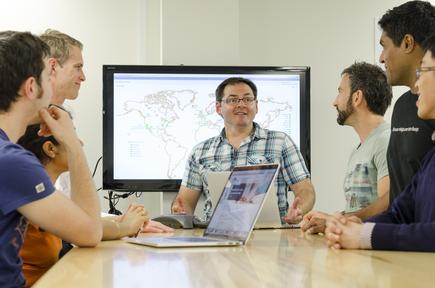
Thomas Salmen, general manager venture enablement at Spark Ventures, notes how cloud based platforms and services have allowed this rapid pace of change around the world.
He says his team is harnessing the same platforms to take on things – like different segments or products – that historically might not be done by the main Spark business.
Salmen joined Spark Ventures nearly two years ago, and said one of the attractions was that the organisation was pitched as an incubator or source of innovation for the bigger Spark (formerly Telecom NZ) organisation.
There are lots of ideas out there, but being able to execute on those ideas…that is the differentiator on innovation.
Salmen, who has moved from chief technology officer to GM venture enablement, says the three tenets of innovation - are execution of ideas, people, and culture.
Read more: CIO Upfront: Is your influence tool chest missing this effective approach?
“There are lots of ideas out there, but being able to execute on those ideas…that is the differentiator on innovation,” states Salmen, who spoke at a forum on the innovative enterprise organised by Amazon Web Services (AWS).
He says working with AWS and other cloud based platforms allowed them to enable the execution of ideas that have led to successes in their business that include Lightbox and Bigpipe.
One of his goals is to bring this thinking and practise to the wider Spark group, as well.
Read more: Get ready for hyperadoption now: Forrester

One of my goals is being able to provide an environment that will drive innovation.
Another panellist, <b>David Kennedy,</b> CIO at Orion Health, declares that one of his goals is being able to provide an environment that will drive innovation.
This includes making available a platform for developers that is controlled by the teams themselves, an area where they can feel free to try out new ideas and concepts – a secure cloud based testing environment - to provide products that will help any user of their systems, whether in New Zealand or overseas.
Read more: CIO Upfront: How to lead through technology fuelled disruption
Related: Business execs need to become venture capitalists and angel investors: Ed Lenta, Amazon Web Services
“For us, it is an interesting challenge: how do you scale innovation and preserve the modus operandi of a startup,” adds Jan Behrens, executive vice president for engineering at Orion Health.
“We have all stuff coming in, devices, and data. It is it is a case of balancing that with delivering at a regular cadence products to the market and against our customer commitments.”
Read more: Gartner: Preparing the IT team for public cloud

Cloud is important, because it is an enabler for innovation.
Behrens goes on to say, “You have to empower teams so they have some form of freedom to think of innovative ideas. It can be something quite mundane, but relevant for them. It could also be a team playing with Google glass for a week, and just having ideas around; can we use this in a clinical environment to present information to clinicians?”
“The main thing is thinking about customers and focusing employee effort, capital and IT resources on the most productive areas to drive value,” says Allan Lightbourne, head of ICT at Mighty River Power.
Read more: Mobile app providers need to focus on retention strategies to ensure relevance in the marketplace
“That requires a clear strategic lens for decision-making and the courage to exit or adjust your focus as your business evolves.”
“If you have an idea, let us talk about it,” he states, and push on and get these things done without necessarily making big technology investments.
This approach, he says, was applied in their continuous improvement of GLOBUG prepay product. He says GLOBUG has changed the way its customers manage their use of power and payment of it.
Users can top up their accounts in outlets through more channels, including internet banking in the GLOBUG app, the GLOBUG website, or in-store, through dairies and convenience stores around the country. They can view their account balance and power usage.

We were able to deliver, iterate and improve based on customer feedback, on a much higher cadence.
Lightbourne explains that what is more important is exposing the information to the users, so they are able to understand how much power they consumed and take more control of their budgeting.
Read more: CIO Upfront: Is there such a thing as bad innovation?
“It is just a groundbreaking customer proposition."
Cloud services have enabled them to deliver this project, he states.
“I can go to an Amazon environment and try stuff with customers, interact with them, and get their feedback.”
“We were able to deliver, iterate and improve based on customer feedback, on a much higher cadence.”
Read more: The government CIO agenda: Flip from ‘legacy first’ to ‘digital first’
It is an interesting challenge: how do you scale innovation and preserve the modus operandi of a startup?
“Cloud is important, because it is an enabler for innovation,” declares Tim Dacombe-Bird, NZ regional manager, AWS. “All industries, all organisations are being driven to move faster.”
“Organisations operate in an increasingly competitive global marketplace. Disruption is a major driver.”
Read more: Vend helps brick and mortar retailers to set up an online store in minutes
Glenn Gore, AWS senior manager, technology solutions, explains that the discussion around cloud services has been shifting away from pure cost savings and different ways of doing IT, to business innovation, to transform the business or customer experience and drive new opportunities.

“If you can lower the cost of failure, these things become possible,” says Gore.
Read more: The top 10 technologies forcing education leaders to rethink their business models
The start-up mentality is about ‘fail fast’, says Gore. “But what they really want is 'fail forward’.”
They make the change, and if they did not get the results expected, they iterate through, he says, “making smaller frequent changes that allow them to test different ideas and get instant feedback, and roll back if they need to.”
Next: Why Spark Ventures is hiring a 14-year-old
Read more: ‘Disrupt digital businesses before you get disrupted!’
Join the CIO New Zealand group on LinkedIn. The group is open to CIOs, IT Directors, COOs, CTOs and senior IT managers.
